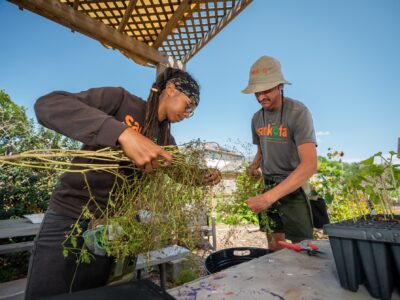Home is a theme behind Alabama’s farmers markets. Whether they are an operation that has found a home in a city for close to a century or because they are a unique marketplace that is on a university and serves its surrounding community. The following three operations know how to make customers feel welcome while in the Yellowhammer State.
Anniston Downtown Market
The Anniston Downtown Market (also known as the Downtown Market) has existed in one way or another since the 1920s, but it has only been located in Historic Downtown Anniston since 2014. It has found its forever home in the freshly renovated City Market Building (126 West 11th St.), coinciding with its 10th anniversary. The Downtown Market sets up shop on Saturday mornings from 7 a.m. to 11 a.m. from early May through early October.
This Alabama Certified Farmers Market draws its vendors from eastern Alabama farmers, growers, and producers from Blount, Calhoun, Chilton, Clay, Etowah, Randolph, and Talladega counties.
As Michelle Smith, market manager, explained to Garden & Health, the Anniston Downtown Market presents more than just a variety of regionally based vendors. Each week, it showcases local musical acts. The market also hosts a handful of chef demos where area cooks prepare seasonal dishes sourced from vendors’ produce. Each year, the operation offers themed events, too, ranging from Tomato Sandwich Day to Dads & Dogs (hot dog grilling) and the Market’s Birthday Bash, to name a few.
Photo Courtesy Anniston Market
Morgan County/Decatur Farmers Market
With a heritage nearly as old as the Anniston Downtown Market, the Morgan County/Decatur Farmers Market (MCDFM) traces its origins back to 1937. This northern Alabama market should be occupying its new permanent home in 2025. However, its primary temporary home for most of 2024 is the rear parking lot behind 609 Social Market and Provisions (609 Bank St.). Despite the short-term pivot, MCDFM still has a full schedule, operating on Mondays from 7 a.m. to noon, Tuesdays from 4 to 8 p.m., and Fridays and Saturdays from 7 a.m. to noon, typically from April through September.
The market focuses on vendors with home-grown or homemade items who hail from Morgan County or the surrounding counties. However, MCDFM is open to vendors from other counties as long as they adhere to the operation’s guidelines.
All farm fresh products, including plants and other nursery items, must be grown by the vendor.
Additionally, all arts and crafts sold must be created by vendors using their own hands. MCDFM aims to keep its farmer/artisan ratio at a minimum of 65% farmers to a maximum of 35% artisans. It also taps into the resources of Sweet Grown Alabama, a nonprofit organization that supports and promotes the state’s farmers while providing consumer services such as the state’s Harvest Calendar.
Photo Courtesy Morgan County/Decatur Farmers Market
Oakwood Farms Market
The Oakwood Farms Market (OFM) is one of the more unique operations — not just in Alabama but all of the United States. OFM is based at Oakwood University, a historically Black, Seventh-day Adventist institution in Huntsville.
The market is basically stocked with items grown on the university’s farm. In fact, Oakwood is the only farm in Huntsville that provides fresh produce at its own market.
That Oakwood is involved in a marketplace isn’t surprising because farming has been a foundational element since the university’s founding in the 1890s. The current market really started in 2016 with a small store on campus.
Now, OFM operates Sundays to Thursdays from 9 a.m. to 7 p.m. and Fridays from 9 a.m. to 5 p.m. during the Spring/Summer and 9 a.m. to 4 p.m. Fall/Winter. The summertime Friday markets (May to October) also feature outside vendors from the region, while the past fall season (November to March) included a Veggie Food Truck Wednesday program. During the pandemic, Oakwood also launched a vegan bistro and started a mobile market bus. It also has a line of private-label items, like natural soda and herbal supplements.
Photo Courtesy Oakwood Farms Market
Beyond the obvious value of its onsite farm-to-market operation, Oakwood also delivers crucial societal benefits for its community. “Our role is important because we serve a food desert, and we are able to help bring low-cost, affordable produce to low-income families,” Bryan Landers, OFM’s general manager, shared with Garden & Health.





